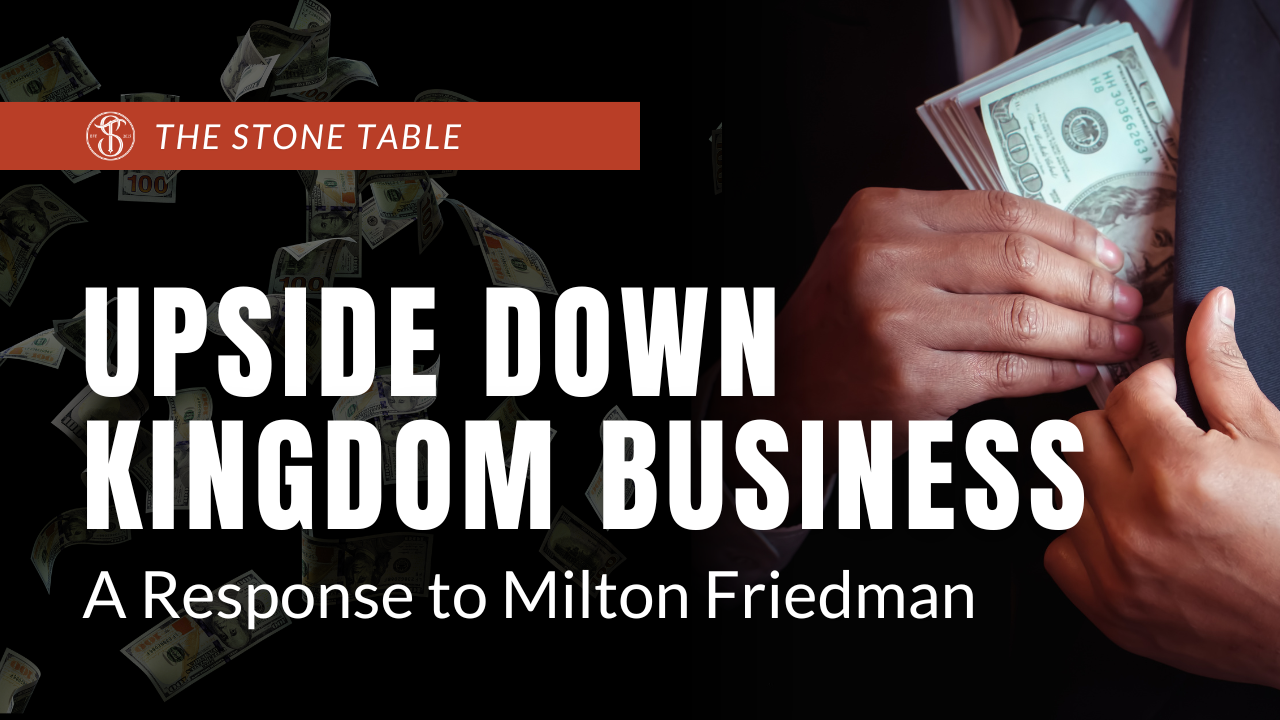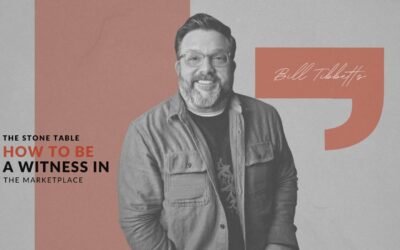“There is one and only one social responsibility of business—to use its resources and engage in activities designed to increase its profits.” (source)
For fifty years, Milton Friedman’s doctrine, also known as “Shareholder Theory,” has embedded itself in the minds of America’s best and brightest business leaders.
And if you’re intent on following Christ in this life, this theory might sound pretty scary.
“Only one responsibility?”
“And it’s profits!?”
“Wait, wait, wait…” you might argue, “we all know what he really means. Of course when the aim is to add profits to shareholders, that is essentially the same as putting the customer first! After all, an unsatisfied customer is bad for business.”
But, is that really true? Or is it just a ruse to make us feel better about greed?
Shareholder Theory
Milton Friedman’s Shareholder Theory says that, since a business is ultimately owned by shareholders, its duty is to achieve those shareholder’s aims. Assuming that shareholders aim to increase profits and grow their investment, then the duty of managers in the business is to maximize revenue and maximize profits.
It is supposed, however, that Friedman’s shareholder theory actually values social issues rather than diminishing them. As stated above, unhappy customers are bad for business. And an angry society will certainly erode the wealth of those who hoard it to their detriment.
If I abuse my workers by making them work long hours in sweatshops, sure this will get me a short-term financial gain. But in the long-run, those workers will fight for their rights, and any would-be consumers will be pressured to boycott my business and run me out of town.
Is It Kool Aid?
So if profits are always good, why aren’t we reading headlines like,
“$2 Trillion Market Cap: Nvidia is Saving America”
“Tesla Shareholders Gain $44 billion: The End to Poverty is Near”
“Investors to Save the Planet: How Healthy Profits Trickle Down”
Even Rabbi Daniel Lapin affirms profitability as good and godly, calling dollar bills “certificates of appreciation.” If dollar bills are signs of appreciation, then aren’t the most profitable businesses bringing the greatest good on earth? Isn’t profit always good?
Jeff Van Duzer, Dean of the School of Business and Economics at Seattle Pacific University, challenges this thinking. He says that the primary purpose of business is to serve, not maximize profits.
No one is motivated by the mission, “Your purpose is to maximize shareholder return!” On the contrary, however, we all intuitively know that people are motivated by purpose. We get up in the morning because we know that the work that we do will “create the future and improve lives” (excerpt from NVIDIA’s CSR page). That is motivational!
Perhaps Milton Friedman’s doctrine would work if we lived in a perfect world where everyone always made rational, perfect decisions, but as Jeff Van Duzer affirms, “that’s just not the world we live in.”
Theory Versus Reality
Behavioral economics, ironically pioneered in the same year as Milton Friedman’s shareholder theory, has clearly demonstrated that people do not make rational decisions. It is for this discovery that Richard Thaler was awarded the Nobel Prize in Economics in 2017.
Among other things, Thaler showed that, even though in theory giving money to all families will level the playing field, in reality this is not the case. More educated earners may choose to save or invest, while others blow the money on lottery tickets, a luxury vacation, or a new car they won’t be able to afford in six months. Thaler showed we can never assume all people will behave in the most rational manner possible.
In the same way, Friedman’s theory is rational, but managers are not. While in theory managers will take whatever action would ultimately end up in the greatest profits for shareholders, in practice, telling a manager to maximize profits causes them to bring about their own demise.
Van Duzer furthers this point. He says that making profitability the bottom line simply causes the business person to be more short-sighted. Just look at the mortgage housing crisis in 2008 and 2009, Enron’s Ponzi Scheme, or the Wells Fargo fake accounts scandal. All of these were full of managers who had “maximizing profits” on their brains.
Jeff Van Duzer proposes that we look at profitability through a new lens:
“Profit is an incredible tool. It’s a tool, not an end in the business. In this way I think of it as kind of like blood circulating in our bodies. If you don’t have blood circulating in your bodies you don’t need to spend a lot of time talking about service. You’re dead! And the same is true for business… but which of us really gets up in the morning and says ‘today, today I’m going to live for the opportunity to circulate blood?’ We don’t do that. Because it’s the means to the end.” (source)
So, we have to consider profitability. It is not only good. It is essential! But it is simply a means to the end of serving one another.
How Much Profit?
It is perhaps because profitability is so often good that some are inclined to argue that it is always good. Rabbi Lapin argues along these lines:
“When you solve a problem for someone you are often rewarded with a certificate of appreciation – we call this money. The more problems you solve, the more certificates of appreciation you get. God is never happier with His children than when they are solving the problems of His other children.” (source)
Another proponent of this thinking, Wayne Grudem, in his book “Business for the Glory of God,” writes that, “profit is fundamentally good.”
Grudem quite selectively, uses the word “fundamentally” to describe profit, and I believe it is quite fitting. As a rule of thumb, profit is good. Selling at a price that is higher than the market rate is either unsustainable or it preys on lack of customer knowledge. Selling at less than market rate is generally unfair because it limits supply to only the first buyers instead of those who will pay the most.
By selling first to those who will pay the most, a business is most readily able to sell to those who will pay the second most, and so on. In this way, profit is fundamentally good, but there are certainly many exceptions. Much like the Friedman doctrine, it is not at first obvious. You might say that profit is good so long as it is providing value to as many people as possible, but those who value it most may not pay the most. And there are many cases where equity rather than equality is the loving and right thing to do.
The question seems rather obvious, then, “Is profit always good?”
Is there never a reason to disadvantage ourselves for the sake of advantage to another?
“Therefore, if what I eat causes my brother or sister to fall into sin, I will never eat meat again, so that I will not cause them to fall.” (I Corinthians 8:13)
Paul knew that God had made all things clean, and yet he admonishes the Corinthians to consider one another in all their actions. And James also adds,
“If anyone, then, knows the good they ought to do and doesn’t do it, it is sin for them.” (James 4:17)
There are also many passages of scripture that establish the need to serve with equity rather than equality.
If this sounds a bit difficult, or messy, let me remind you that, as a Christian, we were not promised that it would be easy. This is all part of the upside-down kingdom of God.
Impact Investing
So was Friedman some greedy businessman with delusions of glowing halos over the heads of America’s business moguls?
No. And in fact, in many ways he was right. Recent studies have shown that impact investing is far more sustainable for economic growth in developing countries than strategies that focus solely on donations or grants.
The 2014 documentary “Poverty Inc” follows dozens of NGOs and government relief programs that failed to recover an economy because they neglected to promote profit-generating businesses.
What economists have found is that, while disaster relief and temporary aid is good, long-term solutions will come from investments in profitable enterprise, particularly in the case of healthcare, banking, education, housing, agriculture, and energy. Where donations provided temporary relief, profitable investing provided the long-term solution.
However, as opposed to Friedman, those profits were not always maximized. Don Simmons, author of “The Steward Investor” and 30-year CFP, writes, “Milton Friedman taught us in the 1970s that the ultimate measure of a company’s success is the extent to which it enriches shareholder value… What if shareholders valued something other than maximizing profit?”
Scripture says that, “..the love of money is the root of all evil” (1 Timothy 6:10) and, “You cannot serve God and mammon” (Matthew 6:24).
Yet, hopefully you may begin to see that donations are not sacred, and investments are not secular. Both are sacred when they are rightfully devoted to God and His purposes. In many cases investing can be beautifully paired with mentorship, accountability, encouragement, and long-term, healthy partnership that charitable dollars would otherwise be devoid of.
Simmons writes that, while the influence of mammon (as referred to in the passage above) is expensive, impatient, frugal, risk averse, imperialistic, and selfish, kingdom capital is affordable, patient, liberal, de-risking, catalytic, and serving.
God’s upside down kingdom places service before earnings.
Is that good business? Yes.
Does it always lead to the highest profit? No. Love is not self-seeking.
Kingdom business seeks to serve.
Kingdom Business Serves
The problem is not profits. The problem is greed.
Greed is an invisible sin in our culture because everyone has it, and no one thinks they do (source).
Most of us intuitively know that when we put people first, we ultimately see a benefit to the bottom line profits. Yet, without stating that people must be placed first, the result is catastrophic.
We know that we are supposed to serve others, but without stating that, we end up with short-sighted, greedy business people pushing unsustainable business practices.
“Do to others what you would have them do to you,” otherwise we are “…like a foolish man who built his house on sand” (Matthew 7:12 and 26).
Jeff Van Duzer takes the argument one step further:
“Under the dominant model, customers and employees are the means of serving the shareholder, and I’m suggesting that from God’s perspective it would be better to look at it the other way around. That capital is there to enable the business to do what it’s supposed to do, which is to serve.”
The primary purpose of business is to serve, not to maximize profits.
This is upside down kingdom business.




